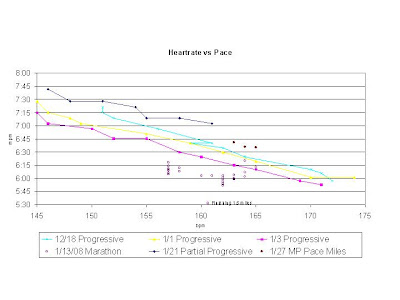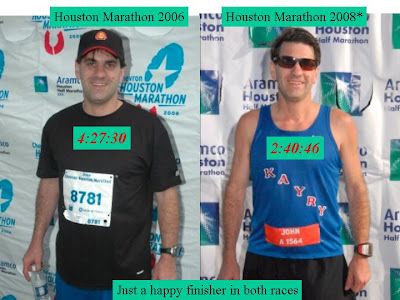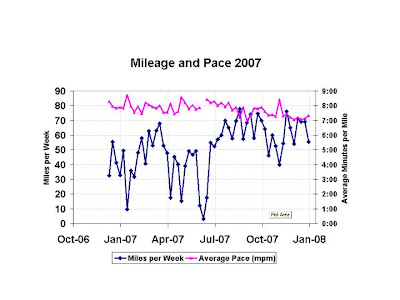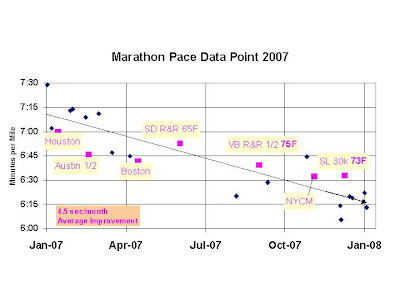Some time has passed since the race and I am still a bit stunned and a bit perplexed by what happen at the Houston Marathon.
16 minute PR from NYCM to Houston – where did it come from?Here is my breakdown:
2 minutes – Houston is flatter than NYCM (McMillan calculator for hills).
0 minutes – slowed by crowded start/weather differences etc – I don’t think these much different.
1 minutes – Sandbag difference Houston I think I had 3 more minutes in me vs NYCM I think I had 4, maybe 5 – for NYC some was bad pacing - too fast first 5k.
6 minutes – Marathon pace Improvement from 10 weeks training between marathons (I could measure 10-15 seconds/mile extra speed in my training runs).
That leaves about
7 minutes I really have no logical explanation and came completely unexpected on race-day and I can only attribute to the benefits of the taper to Houston vs the taper to NYCM.
So Reflections fall into four categories:
1) Cutting the Sandbag factor from 3 minutes to 2 minutes – mental factor of the race.
2) 10 weeks of training to deliver 6 minutes faster running.
3) Taper differences that give 7 minutes.
4) Using a heartrate monitor to deliver the unanticipated on race day.
1) The Mental Factor – Although I’m only crediting 1 minute to this – I actually consider this a KEY ingredient to this race. I think the mental battle was also big in helping me accept the surprise speed I had on raceday. There were two principles that rang out in my head from Fitzgerald's book "Brain Training".
- Embrace the Pain - A mindset to welcome pain as an indication I'm doing something right. It's supposed to hurt.
- Run in the Zone Pre-race - this getting in the Zone started for me days before the race - I would avoid thoughts of contingency plans - I would set goals that fired me up. I found certain words didn’t work in my thinking – like “Conservative” I would have to change to “Controlled” – I can get energized by take it to the edge in a controlled way – but conservative – not so much. I would avoid even thinking the negative side. I even corrected people around me that would start something like "if things don't go as planned" - I didn't what to hear what followed this start.
Race - This is forcing a concentration during the race, knowing I’m running at the edge of capability yet also know I can do it – I’m trained for it, staying in the moment – I was very strict on my mind to only focus one mile at a time – not think about mile 25 or 26 while I’m running mile 20 – just focus on staying strong to the next milemarker. Also I found it very helpful to eliminating distracting thinking like working out math problems or worrying about photo shots or whatever else distracts the mind from concentrating on the race.
2) 10 weeks of training to deliver 6 minutes faster running.Although this may seem remarkable – it is about in line with the improvement pace I’ve had all year which has been roughly 4.5 second per mile per month of training. That plus getting back a little of the speed I had a month or so prior to New York to me pretty well closes the gap.
I don’t think my training was particularly remarkable or unique from what others do although there were a couple things I’ll mention:
- Focused on improving my form – I really think I have developed a more efficient stride by eliminating a bad habit of overstriding. I’d credit the use of things from “Brain Training” by Fitzgerald around using mental cues while running. Its hard to say how much benefit I’ve got from that in going faster. I do credit the running form change with the elimination of my Plantar Fasciitis pain which I’ve struggled with in both feed since Boston and now has completely disappeared, also I didn’t loose toe-nails at Houston (first time for a marathon) – I think - but am not sure yet - that both of those issues came from overstriding.
- I shifted my focus away from 5k paced track workouts to Marathon Paced workouts. I had overemphasized the 5k workouts going to NYC somewhat inadvertently by blending Daniels Elite training and Pfitz 18/70 plans together without noticing the 5k speed work is in different times. My race times showed better results in shorter races than long so I figured I was good on speed anyway and needed to focus on Strength and Endurance so Longer runs and Faster running was where I decided to focus and not on the track workouts. I was a bit unstructured in my workouts for the 10 weeks sometimes making up the workout as I drive out but generally tried to get 3 hard workout in per week a Longrun weekly (18-23) with 5 MP miles at the end, a Tempo or Progressive run in usually ~10 miles and a Medium longrun around 13-15 with 5 MP miles at the end.
- I do like to use the HRM to check my paces especially for MP pace and Tempo Pace and complicated workouts like Progressives. Someone asked me what paces I use once and I posted so rather than repeating I’ll just link to it:
Heart Rate Targets3) Taper differences that give 7 minutes.This one still just makes no sense to me at all. I am just hoping someone else or a few others can repeat this and get similar results to convince me for sure the apparent magical benefits of this. If this is truly from the taper than I cannot expect to have this for tune-up races unless I do similar - I was kinda hoping to break 17 minute 5k next weekend as my Marathon time suggest I should be able to do but if this turbo-charge only comes from the taper - I won't have it because I'm not doing all this for a 5k.
Houston I followed the low end of a plan
fat-pumpkin posted as his typical taper and found similar results on weight loss and difficult to maintain MP pace the second week:
Here's my [fat-pumpkin’s] usual "last 2-weeks"
Su - 8-12 medium
Mo - 8-12 easy
Tu - 8-10 easy w/ 4-5 @ MP
We - 8-10 easy w/ 6-10 easy double
Th - 8-12 easy w/ 4-5 @ MP
Fr - 8-12 easy
Sa - 8 mi w/ 7 at MP
------tot 55-70 mi
Su - 7 mi w/ 6 at MP
Mo - 6 mi w/ 5 at MP
Tu - 6 mi w/ 4 at MP
We - 5 mi w/ 3 at MP
Th - 4 mi w/ 2 at MP
Fr - off
Sa - 2-3 easy
------tot 30 mi
Su - RACE
I usually follow the old-school depletion/load scheme & actually deplete for ~10- days before the 3-day load. I can usually lose 4-5 lbs net before the race. That makes it really hard to run some of the MP so I play it by ear and adjust to make sure I don't work it too hard = MP EFFORT rather than absolute pace.
Other Factors:Fueling Pre-Race and during race was not remarkably different except that I carried 24 oz Accelerade with me at NYC vs just mainly used Gu and water at Houston.
Mileage for NYC was pretty much the 18/70 Pfitz taper mileage – a 3 week taper vs fat-pumpkin’s 2 week.
Both NYC and Houston I did 3 days carb loading prior to race – not remarkably different.
4) Using a heartrate monitor to deliver the unanticipated on race day.For Marathon Pace – I have combined my experience in prior marathons, Daniel’s Running Formula and data from other runners off MotionBased to set my target at 164 and I still think I can maintain that, or near that if I run without sandbagging.
- For my experience – I was able to maintain 165 average thru ~23 miles in San Diego last year than crashed the last 5k – so figured that might be just a little too high. At Boston I averaged between 161-162 and finished remarkably strong – figured that might be a little too low – so answer between 162 and 165.
-From Daniel’s table 2.2 I can create a formula [0.822+0.09*(VDOT-30)/55] which works well in my vdot range so figuring my vdot potential was around 60 I calc 87% * 187 maxhr = ~163 – same ballpark.
- On MotionBased I filtered to races I knew to be good conditions and sorted out the runners that would post there heartrate data and found several strong race performances in the 87-88% max heartrate range.
- All that together – and me being an aggressive sort – I rounded up to 164 as the target heartrate – I may give 163 a try next race. Each 1bpm for me seems to represent ~3 seconds per mile pace difference so it’s worth nearly 1.5 minutes off the MP pace to me to run one faster if it can be sustained.
- Heat and Humidity factors are the big and not well understood wildcard to me. It should be conservative to use same targets for warm races but I don’t really know how much to adjust up and still be able to hold the distance.
- I’ve heard several talk about the heartrate drifting up at the end of the race – caused by dehydration – I have never been able to demonstrate this in a marathon – not sure why – but for whatever reason my heartrate does not seem to drift up even to the end of the race.
That's it for my reflections today. I'd really like to see someone repeat that fat-pumpkin taper plan and get a similar step change. If someone does it please let me know.






